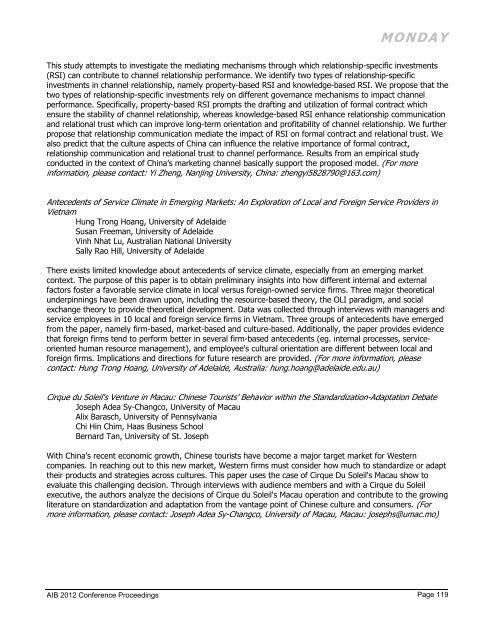AIB 2012 Conference Proceedings - Academy of International ...
AIB 2012 Conference Proceedings - Academy of International ...
AIB 2012 Conference Proceedings - Academy of International ...
Create successful ePaper yourself
Turn your PDF publications into a flip-book with our unique Google optimized e-Paper software.
MONDAY<br />
This study attempts to investigate the mediating mechanisms through which relationship-specific investments<br />
(RSI) can contribute to channel relationship performance. We identify two types <strong>of</strong> relationship-specific<br />
investments in channel relationship, namely property-based RSI and knowledge-based RSI. We propose that the<br />
two types <strong>of</strong> relationship-specific investments rely on different governance mechanisms to impact channel<br />
performance. Specifically, property-based RSI prompts the drafting and utilization <strong>of</strong> formal contract which<br />
ensure the stability <strong>of</strong> channel relationship, whereas knowledge-based RSI enhance relationship communication<br />
and relational trust which can improve long-term orientation and pr<strong>of</strong>itability <strong>of</strong> channel relationship. We further<br />
propose that relationship communication mediate the impact <strong>of</strong> RSI on formal contract and relational trust. We<br />
also predict that the culture aspects <strong>of</strong> China can influence the relative importance <strong>of</strong> formal contract,<br />
relationship communication and relational trust to channel performance. Results from an empirical study<br />
conducted in the context <strong>of</strong> China’s marketing channel basically support the proposed model. (For more<br />
information, please contact: Yi Zheng, Nanjing University, China: zhengyi5828790@163.com)<br />
Antecedents <strong>of</strong> Service Climate in Emerging Markets: An Exploration <strong>of</strong> Local and Foreign Service Providers in<br />
Vietnam<br />
Hung Trong Hoang, University <strong>of</strong> Adelaide<br />
Susan Freeman, University <strong>of</strong> Adelaide<br />
Vinh Nhat Lu, Australian National University<br />
Sally Rao Hill, University <strong>of</strong> Adelaide<br />
There exists limited knowledge about antecedents <strong>of</strong> service climate, especially from an emerging market<br />
context. The purpose <strong>of</strong> this paper is to obtain preliminary insights into how different internal and external<br />
factors foster a favorable service climate in local versus foreign-owned service firms. Three major theoretical<br />
underpinnings have been drawn upon, including the resource-based theory, the OLI paradigm, and social<br />
exchange theory to provide theoretical development. Data was collected through interviews with managers and<br />
service employees in 10 local and foreign service firms in Vietnam. Three groups <strong>of</strong> antecedents have emerged<br />
from the paper, namely firm-based, market-based and culture-based. Additionally, the paper provides evidence<br />
that foreign firms tend to perform better in several firm-based antecedents (eg. internal processes, serviceoriented<br />
human resource management), and employee's cultural orientation are different between local and<br />
foreign firms. Implications and directions for future research are provided. (For more information, please<br />
contact: Hung Trong Hoang, University <strong>of</strong> Adelaide, Australia: hung.hoang@adelaide.edu.au)<br />
Cirque du Soleil's Venture in Macau: Chinese Tourists' Behavior within the Standardization-Adaptation Debate<br />
Joseph Adea Sy-Changco, University <strong>of</strong> Macau<br />
Alix Barasch, University <strong>of</strong> Pennsylvania<br />
Chi Hin Chim, Haas Business School<br />
Bernard Tan, University <strong>of</strong> St. Joseph<br />
With China's recent economic growth, Chinese tourists have become a major target market for Western<br />
companies. In reaching out to this new market, Western firms must consider how much to standardize or adapt<br />
their products and strategies across cultures. This paper uses the case <strong>of</strong> Cirque Du Soleil's Macau show to<br />
evaluate this challenging decision. Through interviews with audience members and with a Cirque du Soleil<br />
executive, the authors analyze the decisions <strong>of</strong> Cirque du Soleil's Macau operation and contribute to the growing<br />
literature on standardization and adaptation from the vantage point <strong>of</strong> Chinese culture and consumers. (For<br />
more information, please contact: Joseph Adea Sy-Changco, University <strong>of</strong> Macau, Macau: josephs@umac.mo)<br />
<strong>AIB</strong> <strong>2012</strong> <strong>Conference</strong> <strong>Proceedings</strong><br />
Page 119

















